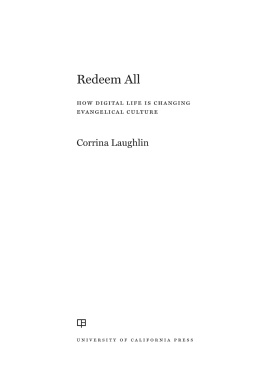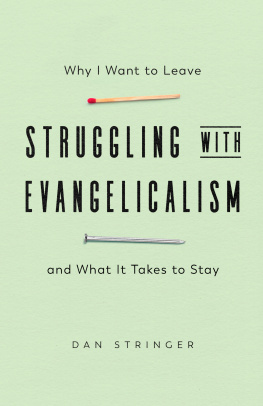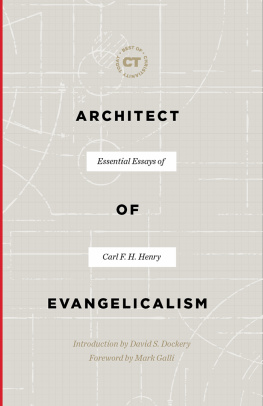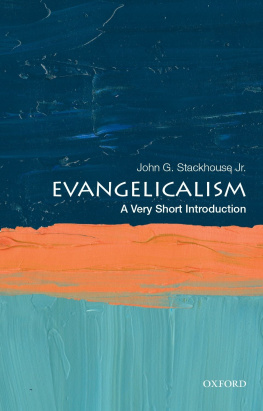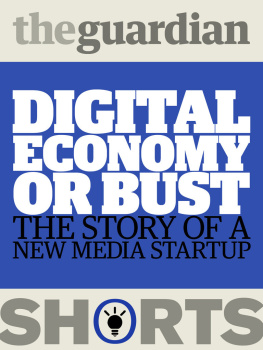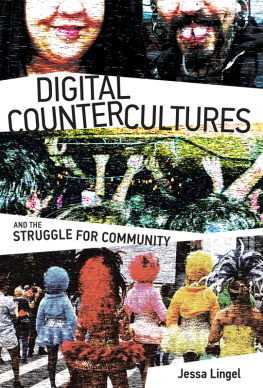Acknowledgments
First and foremost, this book could not have come about without the generosity and openness of the people quoted throughout. Over a decade-long period, Christians all over the country invited me into their homes, offices, and churchesand for that I am incredibly grateful.
This project started as a masters thesis at New York University, and without the support of Thomas Augst it would not have even begun. It continued at the Annenberg School for Communication at the University of Pennsylvania under the incomparable guidance of John L. Jackson Jr. Along with John, my dissertation committee at AnnenbergCarolyn Marvin, Guobin Yang, and Anthea Butlerprovided invaluable input and introduced me to methodological and theoretical frameworks that guided my thinking. Throughout my time at Annenberg, I was privileged to be exposed to the teaching and research of exemplary scholars, including Sharonna Pearl and Barbie Zelizer. My colleagues provided and continue to provide inspiration. I am especially indebted to Sun-ha Hong and Aaron Shapiro, who helped me write the proposal for this book, and to Lee McGuigan, who offered support and advice as I was writing it.
I have also been supported by incredible, inspiring colleagues at Loyola Marymount. I especially appreciate Michele Hammers and Meng Li, who spent time reading and offering feedback on parts of the manuscript. Outside of my home university, a rotating cast of stellar scholars whom I consider my religion and media tribe helped me conceive of this book and have provided great feedback and advice. In particular, I thank Stewart Hoover, who has been a kind and caring mentor.
Everyone at the University of California Press has been lovely to work with, especially editors Lyn Uhl and Michelle Lipinski, who guided me through this process. I would not and could not have finished this book without the support of Gaby Gil, Rocio, and Manny, who kept their daycare open during the COVID-19 pandemic and who became our central support system during a traumatic year. My parents, Tim and Teresa Laughlin, and my in-laws, Tom and Sharon Merchant, have also provided support and care.
Last, I thank my husband, Brian Merchant, who has remained my best booster and editor, and my beautiful children, Aldus and Russell.
Introduction
Christians should be at the head of innovation and not the tail. We shouldnt wait for Google or for Apple to come out with Christian innovation, it should be the Christians trying to innovate for what is needed in the Kingdom.
Jeyanti Yorke
The day that the iPhone came out I was in Las Vegas at the Consumer Electronics Show in the Nokia tent. Heard the announcement ... and I hit publish on a page that said how to get your Bible onto an iPhone.
Antoine Wright
In the summer of 2013, in an underground conference room on the basement level of a labyrinthine megachurch in Dallas, Texas, I watched a Christian social media consultant give a presentation to a room full of evangelicals. During his PowerPoint talk, which focused on how churches could incorporate social media into their outreach strategies, he told the audience: Weve never been more equipped and more resourced to get the message of the gospel out there.... I really do believe that we could be part of that generation or part of raising up the next generation that could see Christ return. And we have an amazing opportunity, but were going to be held accountable for how we stewarded what God gave to us.
In the cosmic play of Christian history, many evangelicals see the contemporary moment as the final or penultimate act before the return of Christ, or the Rapture. As such, Christians living on Earth during this time believe that they have a responsibility to do everything in their power to fulfill what they call the Great Commission, the biblical imperative to bring the gospel, or the message of the Bible, to all people. As this social media consultant suggested to his audience, individual believers will be judged by God based on how effectively they can harness these God-given tools to proselytize and convert nonbelievers through religious apps, VR experiences, Instagram stories, podcasts, and beyond. This book, Redeem All , tells the stories of those passionate American evangelical media makers whose work is inspired by this directive. These Christians want to redeem the internet, to redeem Silicon Valley, to redeem evangelical culture, to redeem the globe, and in every instance their work lines up with spiritual principles and purposes. To these ends, American evangelicals have innovated, hacked, lauded, and adapted digital media technologies, but I argue that as they embrace what I call digital habitus, they have opened Pandoras box, releasing new authorities, forms, and discourses that have changed evangelical culture forever.
This book represents a decade of qualitative research guided by the ethnographic principle to follow the habitusa remix of the anthropologist George Marcuss (1996) famous dictum. Marcus wrote at a time when increasing globalization rendered the ethnographic ideal of a field site obsolete. For Marcus, ethnographers needed to adapt by following their subjects across borders in real and virtual ways. This research principle has led me to conferences in megachurches, to online chatrooms for millennial evangelicals, to Twitter hashtags, to home offices of prominent Christian technologists, to coffee shops, to Silicon Valley start-ups, to the cafeterias of big tech companies where religious tech workers toil, to churches in the American South pioneering online community platforms, to towns in New Jersey, to my southern California hometown, to Oklahoma, to New York City.
The decade during which I undertook this project was punctuated by events that led me to reimagine the story I was writing. I witnessed the shifting evangelical response to the legalization of same-sex marriagewhat had originally seemed to be a central wedge issue that fueled the culture wars was sidelined. New Christian celebrities arose on Instagram, YouTube, and on podcasts, reorienting the evangelical media landscape. The 2016 election of Donald Trump upended the widespread assumption about evangelicals drifting to the political center. The #MeToo movement sparked passionate conversations about sexual abuse and harassment in evangelical culture. The COVID-19 crisis saw evangelicals further embracing online church and other digital tools. And the 2020 uprisings against police brutality created space for another jolt in the conversation around race within the evangelical church. At each turn, I watched as these moments played out dramatically over social media outlets such as Twitter, Facebook, and Instagram. I talked through new ideas with passionate Christian media makers. And I watched American evangelical culture change, post by post.

